“That side of the road is Bangladesh, this side is India. We don’t go there and they don’t come here,” says Jamaal Hassan (43), sounding panicky. “The police should go after them, not us. We are Indians, it’s our birthright to live and work here.”
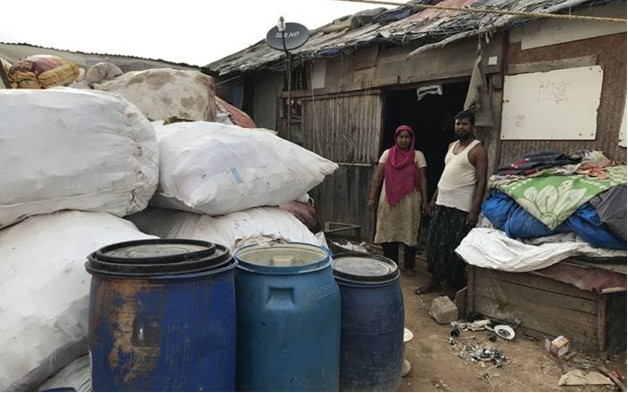
Mahima Begum and Mohammed Kabir Khan hailing from Khulna district of Bangladesh live in the KaaliKhaata area of Thubarahalli where they segregate garbage for a living. Civic conditions are far worse in KaaliKhaata than in the areas inhabited by Indian Bengali Muslims. All photos by SudiptoMondal
Hassan is one of the 5,000 Bengali-speaking Muslim labourers who live in a confusing maze of tarpaulin and tin shanties in Thubarahalli village located along the tech corridor of East Bengaluru.
The Bengalis have their own names for the clusters in Thubarahalli. The ‘Bangladeshi side’ is called ‘KaaliKhaata’ (Bengali slang for the waste recycling) because garbage segregation is their main occupation. The ‘Indian side’ is called LaalMaati (red earth) where most are employed in the construction sector.
The actual Indo-Bangladesh border is at least 2,000 kilometers away. But the situation in Thubarahalli is as grim as in India’s border states, particularly Assam, where the National Register of Citizens (NRC) was recently updated to identify illegal Bangladeshi immigrants.
The reason for Jamaal’s anxiety in faraway Thubarahalli’s ‘mini-Bengal’ is that a similar scenario is set to unfold in Karnataka where tens of thousands of Bengali Muslims are employed across the informal sectors of construction, waste recycling and agriculture.
The state government, following orders of the central home ministry, is weeks away from opening a detention centre for illegal foreigners in the city with a special focus on nabbing illegal Bangladeshi immigrants.
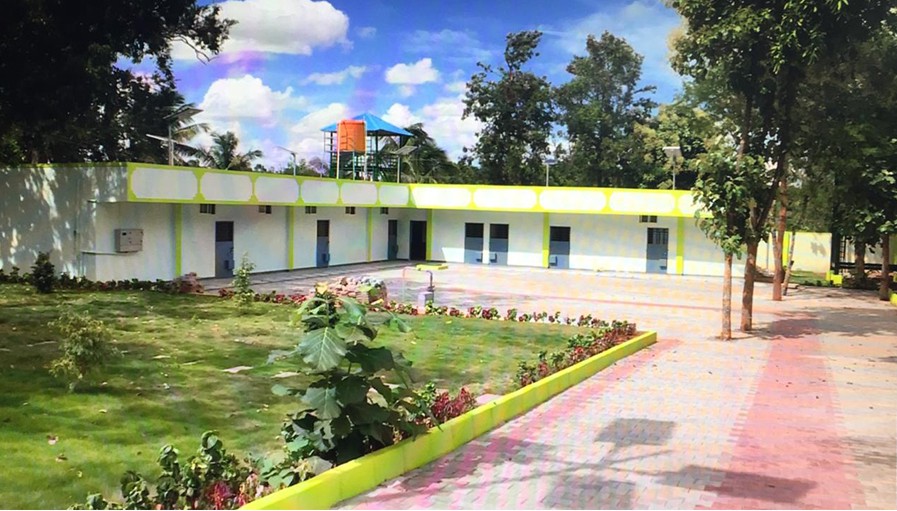
The detention centre for illegal foreigners in Bengaluru is weeks away from opening and will focus on illegal Bangladeshi immigrants.
It will make Karnataka the second Indian state, after Assam, to have such an exclusive facility to hold people declared as illegal foreigners by the courts.
The BJP’s national vision
The Bengaluru detention centre is apparently just the first step towards the larger vision of the BJP, which said in its 2019 election manifesto that it would compile NRCs across the country and deport undocumented immigrants, particularly those from Bangladesh.
Addressing Parliament in July, Union Home Minister Amit Shah had said, “We want to stop infiltration and also push every single infiltrator out of the country. As far as Hindu refugees are concerned, we are bringing the Citizenship Amendment Bill to give them Indian citizenship.”
Assam was plunged into chaos in July 2018 when four million people, mostly Bengali-speaking Muslims ostensibly, were left out of the first draft of the citizens register. The large-scale exclusions led rights groups to accuse the Hindu nationalist BJP state and central governments of carrying out an anti-Muslim purge.
The state, with a 35 per cent Muslim population, has been on the edge after 1.9 million names were left out of the final NRC list published on August 31.
As in Assam, so also in Thubarahalli, it is difficult to tell which Bengali Muslim is from Bangladesh. Only the residents know the difference between KaaliKhaata and Laal Maati.
They speak the same Urdu and Sylheti-infused dialect of Bengali that is spoken in districts on both sides of the 4,156-km international border. The minor variations are hard to tell apart even for a native Bengali speaker like this reporter.
Women’s ornaments and fabrics, men’s sarongs and hairdos, children’s games, the cuisine, the music blasting in the carrom clubs where the men unwind in the evening — all reflective of a common culture that is influenced as much by Islam as by an amorphous pan-Bengali consciousness.
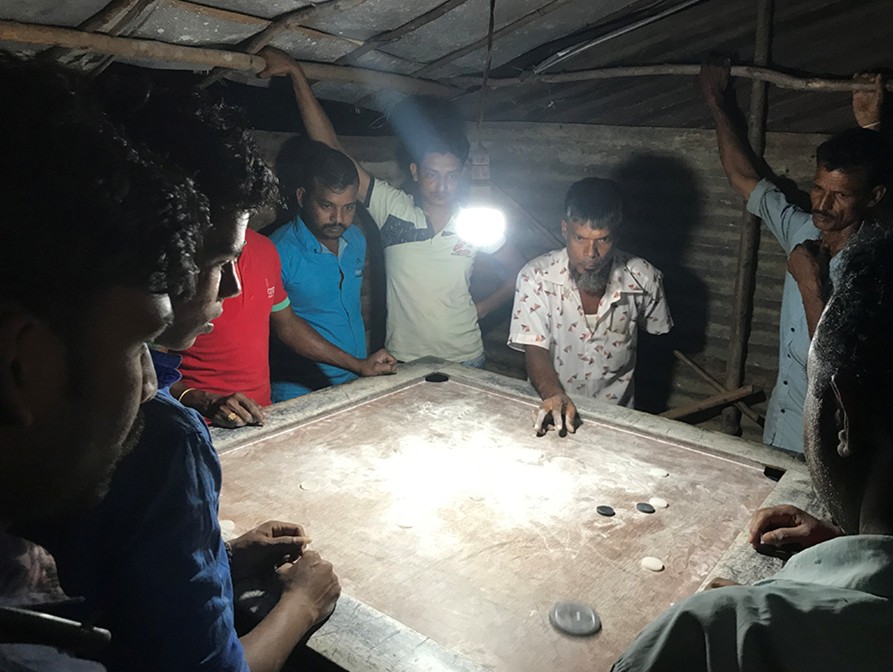
Bengali Muslim workers hailing from West Bengal’s border districts such as Malda, Murshidabad and Dinajpur unwind after a hard day’s work in carrom clubs like this which are spread across Laal Maati.
Why Thubarahalli, why Karnataka?
Senior Kannada language journalist and political commentator, IrshadUppinangady says that trouble has been brewing for Bengali Muslim labourers in Karnataka ever since Prime Minister NarendraModi’s government came to power in the country in 2014 on the back of a right-wing surge.
“Like for Donald Trump and hardline Republicans in the US, who want to build a wall on the Mexican border, anti-Bangladeshi xenophobia and Islamophobia are central themes in the Hindutva narrative of Modi and BJP,” Irshad tells The Federal.
Even as the humanitarian crisis triggered by the NRC in Assam was making international headlines, Irshad says BJP leaders in Karnataka and regional big media outlets sympathetic to the party started raising the pitch against Bengali Muslims in the state.
“There were centre-spread features and prime time debates in right-wing news outlets. Bengali Muslims were openly described as a terrorist threat in the media by senior journalists and BJP leaders,” he says.
BJP MP from Bengaluru, PC Mohan is one of the party’s flag-bearers on the issue and described by many as the man behind the idea of the Bengaluru detention centre.
Speaking to The Federal, he describes himself as a “humble servant” of the party and says, “I am only implementing the vision of our leaders NarendraModi and Amit Shah.” He warns that the detention centre in Bengaluru is only the beginning.
“We will work towards building such facilities in other districts too. There are thousands of illegal Bangladeshis in the coffee plantations of Kodagu and Chikmangalur districts, many more in the farms of north Karnataka,” he says.
Irshad, however, argues out that the Bengaluru detention centre would not have been possible without the support of leaders from the so-called secular Congress party, which was in power in the state until recently.
“It has been a feature of the Congress to be on the back foot and tread a soft-Hindutva line every time the BJP intensifies a campaign based on religious polarisation.”
Senior state Congress leaders Ramalinga Reddy and G Parameshwara, Irshadadds, matched the BJP’s anti-Bangladeshi and anti-Muslim rhetoric step for step. “They both held the post of home minister (in-charge of law and order) and played a key role in encouraging the police against Bengali Muslims by making public statements against the community,” he says.
Reddy and Parameshwara, however, refused to speak to The Federal on the issue.
Harassed and discriminated
R Kaleemullah, from the city-based NGO Movement for Justice, says that in the past five years, Bengali Muslim labourers in Bengaluru have been harassed endlessly by the city’s civic officials and the police.
“For the BJP and the police, using the Bangladeshi tag is just an excuse to target Muslims. There have been dozens of cases in the last five years where people with authentic Indian IDs have been falsely implicated as illegal foreigners,” he says.
Many of these cases fell flat in the courts, Kaleemullah says, thanks to the efforts of the city’s human rights lawyers. “When they realised it wasn’t going to be easy to fix people in such cases, the police, at the instance of BJP leaders, started filling false cases of theft, prostitution and drug trafficking against them.”
Kaleemullah says most of the energy of human rights activists and lawyers is concentrated in Thubarahalli. “There are much larger Bengali Muslim settlements in Sarjapur, Bellandur, Hosur and other parts of the city’s outskirts where we have not been able to do much work. The situation there and in other parts of the state is much worse,” he says.
Kaleemullah is careful to point out that he and the other activists are only working to rescue genuine Indian citizens. “In Modi’s India, as a Muslim, I can very easily be bracketed as a Bangladeshi supporter or even a terrorist sympathiser. Our struggle is only to ensure that no Indian suffers. The Bangladeshis are extremely poor people but we can’t save them,” he says.
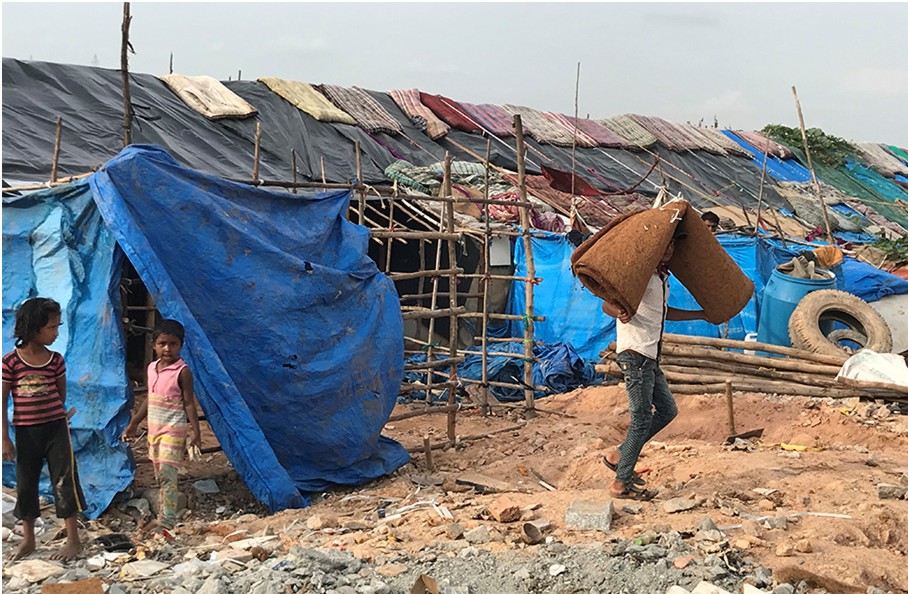
Areas like KaaliKhaata are where the city’s garbage gets segregated. The unsanitary conditions and the heaps of garbage make for a post apocalyptic picture.
Bangladeshis: The backbone of Bengaluru’s garbage management
In Thubarahalli’sKaaliKhaata, the residents are surprisingly candid about being from Bangladesh.
“I am from Khulna district of Bangladesh. I have been living here for 12 years and before that I was in Delhi for 20 years. What is there to hide? I’m here because there’s work. I’m not stealing or murdering people for money,” says Mahima Begum (40).
She is also open about the fact that she and her family got voter IDs made through a broker for a bribe of ₹2,000 a piece and Aadhaar cards for ₹1,000 each.
Mahima and her husband Mohammad Kabir Khan (48) say that there are at least 2,000 Bangladeshis among the 5,000 Bengali Muslims in Thubarahalli. “This is still a small settlement, the ones in Sarjapur and Hosur are double this size. Everybody is in the KaaliKhaata business,” Kabir says.
Confirming this, former Bengaluru city council member M Paari says, “Bangladeshis are the backbone of the garbage recycling industry in the city. Earlier it would be Telugu-speaking Dalits, but they slowly moved away into construction where wages are better and more likely to be paid.”
According to Paari, contractors hired by the city corporation to transport garage to the recycling centres are notorious for underpaying, delaying and defaulting on payments to workers. “Bangladeshis are the only ones who are desperate enough to do this inhuman work. They depend on money from selling scrap not on the wages from contractors,” he says.
Kabir confirms this and says that he is supposed to be paid ₹10,000 per month to transport dry waste to the outskirts of the city but has been paid only ₹3,000 for the last one year.
Mahima insists that things are still not as bad as back home in Bangladesh where, according to her, essentials are more expensive and wages lower. “We make around ₹12,000 from selling the garbage that he collects,” she says and trails off, “copper, aluminum, iron, paper, plastic, bottles, human hair, mattresses, shoes and jackets.”
About the drive to oust Bangladeshis from Bengaluru, she says, “We have all the Indian ID cards.” Asked what she plans to do if the police discover that her ID is fake, she says, “There’s nobody here to speak for us. If they don’t want us here, we will go back. They can’t shoot us, can they? But if we go, who will do this work?”
What would they do in Bangladesh if things are as bad as they say? “Same work, maybe work in the ship-breaking yards in Chittagong. We don’t know any other work, this is our skill. That’s why contractors all the way from Bengaluru come to hire us,” Kabir says.
The couple, whose hut is overrun by heaps of dry garbage, thinks that life is better on the other side of the road in LaalMaati. “They have proper IDs; that’s why they can fight the police. They can work in any field but we cannot because we are always afraid of being caught.”
As things go, those in LaalMaati think that the people of KaaliKhaata have it better.
“There’s a lot of money in garbage. A kilo of human hair sells for ₹3,000,” says Jamal dismissively when asked about the terrible living conditions in KaaliKhaata. “Can people like you and me sit for days and pluck hair out of heaps of garbage? No, but the Bangladeshis can,” he says condescendingly.
He resents their presence in the area and blames them for LaalMaati’s troubles with the police. “We will be more than willing to show the police who the Bangladeshis are but they are only after us just because we are Muslim,” he says.
The residents of LaalMaati went the extra mile to prove their love for India. They celebrated the country’s Independence Day by hoisting the Indian flag in LaalMaati. “We invited the police also for the flag hoisting,” Jamal says, “But they did not come.”
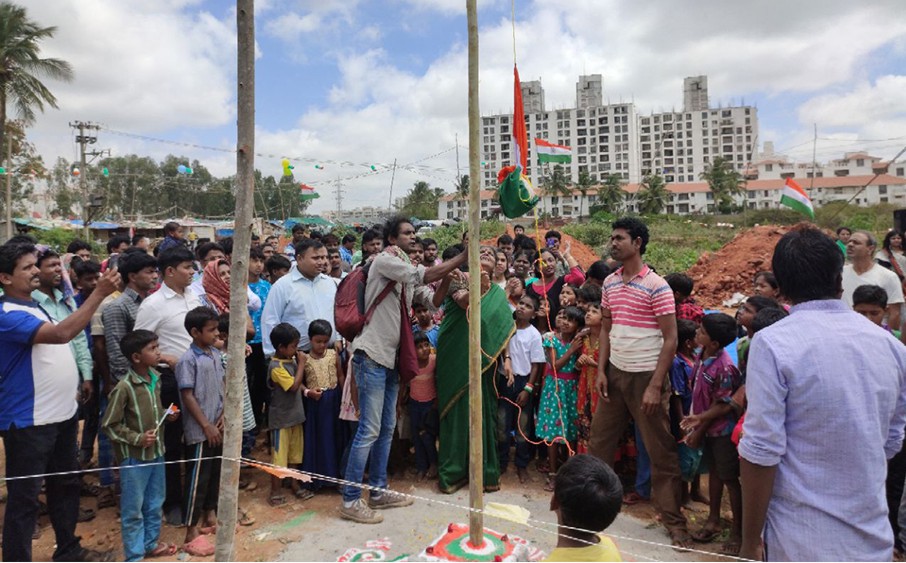
Bengali Muslim residents of Lala Maati celebrating india’s independence to prove their patriotism.
Responding to fears that innocents might suffer as a result of the drive against undocumented Bangladeshis in Karnataka, the state’s additional director general of police for law and order (ADGP-L&O), Kamal Pant says that the police will do its job professionally.
“They are being hired because Bangladeshi labour is cheaper. The department will make contractors aware of the security and legal implications of hiring illegal foreigners,” he says.
The article first appeared in The Federal and is being republished here with the author’s permission